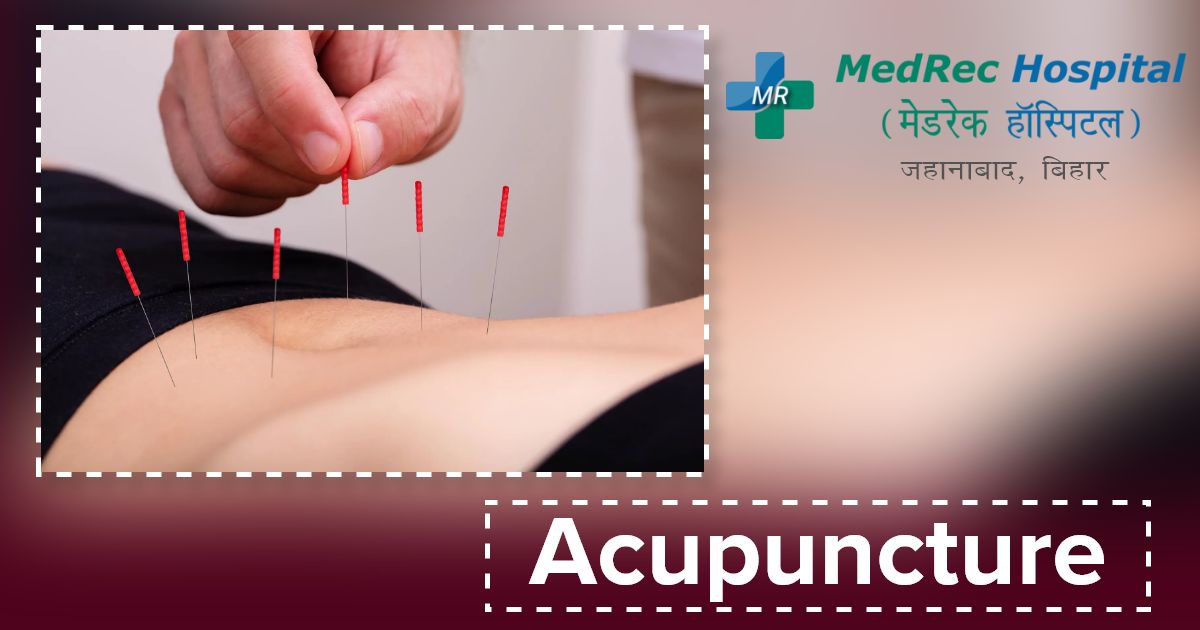
Acupuncture : Everything You Need to Know | Benefits, Techniques & Risks
1049
Traditional Chinese medicine has evolved into the medical discipline of acupuncture. Tiny needles are inserted into the body at specific spots to relieve pain.
It is increasingly used for general wellness purposes, such as stress reduction.
Acupuncture is a technique for controlling the flow of chi or qi (chee), which is said to travel via meridian channels in your body, according to traditional Chinese medicine. By inserting needles at certain points along these meridians, acupuncturists contend that your energy flow will be balanced once again.
Contrarily, many Western practitioners consider acupuncture points to be sites where muscles, connective tissue, and nerves can be stimulated. Some claim that this stimulation raises your body's production of its own painkillers.
How does it work?
There are 2 types of acupuncture: medical and traditional.
Medical Acupuncture
A medical diagnosis is required before beginning acupuncture treatment. It involves igniting sensory nerves in the muscles and beneath the skin.
This causes the body to produce endorphins, which relieve pain. These naturally occurring chemicals produce the positive benefits of acupuncture.
A series of acupuncture treatments enables more long-lasting results.
Traditional Acupuncture
Traditional acupuncture is dependent on the idea that the body's meridians are channels through which energy, or "life force," flows. Qi is the name for this vital energy (pronounced "chee").
Traditional acupuncture practitioners hold the view that sickness might result from Qi not flowing freely through the body. They also think that acupuncture can improve health by reestablishing Qi flow.
Why is it done?
Acupuncture is primarily used to reduce pain brought on by a number of illnesses and disorders, such as:
- Postoperative nausea and vomiting brought on by chemotherapy
- Tooth pain
- Fibromyalgia
- Headaches, such as migraines
- Labour ache
- Lower backache
- Sore neck
- Osteoarthritis
- Severe Period cramps
- Breathing problems
How to check if you require acupuncture?
Acupuncture specialists, often known as acupuncturists, apply acupuncture to treat a variety of medical conditions. Acupuncture usage, however, is not always supported by solid scientific research.
Acupuncture can be good pain relief for certain conditions but please consult your doctor for medical advice.
Acupuncture can be considered a good potential treatment for the following conditions:
- Chronic pain
- Tension headaches
- Migraines
- Pain-related diseases
- Dental pain
- Joint pain
- Postoperative discomfort
Please seek medical advice from your doctor before considering traditional acupuncture. The Medrec hospital team can provide the best medical advice for your concerns.
Risk Factors
If you receive acupuncture from a qualified, licenced practitioner who uses sterile needles, the risks are minimal. There may be soreness and slight bleeding where the needles were located. Since disposable needles are now the norm, there is little chance of infection. Acupuncture is not appropriate for everyone.
Be sure to inform the acupuncturist about the following before beginning treatment:
- Possess a bleeding condition. If you use blood thinners your risk of bleeding from the needles is increased.
- Possess a pacemaker. It is possible that acupuncture that uses light electrical pulses on the needles will affect how a pacemaker functions.
- If you are expecting. Some acupuncture locations can induce childbirth and there can be a risk of premature labour.
If you're thinking about trying acupuncture, let your doctor know. He or she might be able to provide you with information on the success rate of using acupuncture to treat your condition or suggest an acupuncturist.
Procedure
An initial acupuncture session typically lasts up to 60 minutes and includes a physical examination, medical history review, and evaluation of your overall health. The acupuncture needles are then inserted.
The number of different sessions that make up a course of therapy might vary.
Acupuncturists refer to needle locations as acupuncture points and insert the needles there.
You will be required to sit or lie down during the session. In order for the practitioner to access specific areas of your body, you might also be required to take off some clothing.
The needles are small and a few centimetres in length. For safety, they need to be sterilized needles and then disposed of safely . The needles are positioned deeply enough to penetrate the muscle. Once the needles are in place, they can stay their maximum of 30 minutes.
When the needles are implanted, you can feel tingling or dull aching, but you shouldn't feel any severe pain.
Please inform your practitioner if you feel any pain.
Complications of Acupuncture
Please ensure to check that the acupuncture practitioner is either a licensed healthcare professional, such as a doctor or nurse. They can also be a member of a national acupuncture organisation.
Acupuncture is safe when performed by a licensed professional. Some individuals encounter side effects like:
- A worsening of symptoms
- Pain where the needles penetrate the skin
- Blood or bruising where the needles puncture the skin.
- Fatigue, and fainting.
Please consult your Doctor prior to receiving acupuncture if you have a bleeding problem, such as haemophilia, or are taking anticoagulants.
If you have an allergy or an illness in the place where needles may be put, acupuncture is often not recommended.
For further information please access the following resources-
Emergency : +91 89686 77907
Front Desk : +91 98018 79584
Page last reviewed: Mar 3, 2023
Next review due: Mar 3, 2025







.jpg)
.jpg)
.jpg)
.jpg)
.jpg)
.jpg)